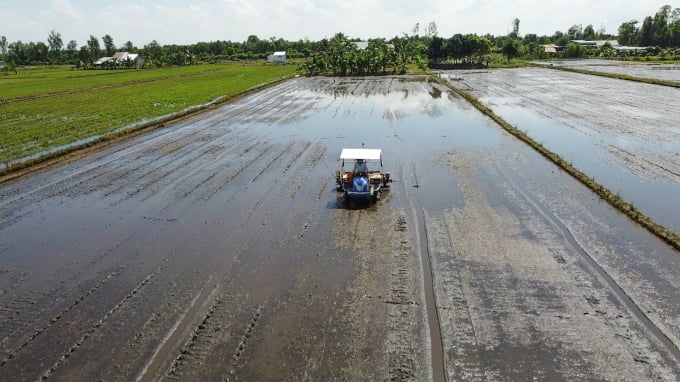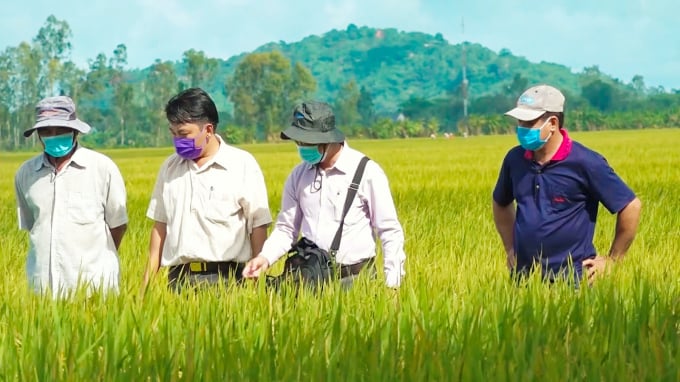June 15, 2025 | 19:12 GMT +7
June 15, 2025 | 19:12 GMT +7
Hotline: 0913.378.918
June 15, 2025 | 19:12 GMT +7
Hotline: 0913.378.918
Farmers participating in VnSAT Project have been trained in many new techniques in rice production, particularly "3 reductions, 3 gains" (3R3G) and "1 must, 5 reductions" (1M5R).
3R3G refers to reductions in seed, chemicals, and water; and gains in productivity, quality, and economic efficiency while 1M5R means using registered seeds and reductions in seed, chemical fertilizer, pesticide, water use, and post-harvest loss.
One of the pioneers who have got determined to change local farmers’ mindset is Nguyen Thanh Hong, Chairman of the Board of Directors, cum Director of Toan Phat Cooperative in Thanh Phu Commune, Co Do District.
“I have to be the first to apply the regulations and standards of the agricultural industry. The habits of farmers are difficult to change in a short time but I believe that I will be able to,” he emphasized.
Hong said he and other cooperative members have strictly attended the training programs of the VnSAT project. He assessed that sparse transplanting is a very good method that the agricultural industry is focusing on and through actual practice, the model helps to reduce the amount of seeds, fertilizers and pesticides, thereby reducing the cost of rice production.

The VnSAT project offers training in farming techniques "3 decreases, 3 gains" and "1 must, 5 reductions" that aim to change farmers' thinking about rice production. Photo: Kim Anh.
The mobilization of farmers to use organic fertilizers to gradually replace chemical types is also being actively deployed and replicated within members of the cooperative.
“In the past when farmers used to cultivate rice individually, I encouraged my relatives to cooperate in production in the cooperative. The Department of Agriculture and Rural Development and the City Sub-Department of Cultivation and Plant Protection also regularly organized training courses for farmers. Farmers only follow what they believe and could envision in a short term,” Hong noted.
Established in early 2017, Toan Phat Cooperative has eight official members and more than 100 associate members. In this summer-autumn crop of 2022, the cooperative cultivates two main rice varieties, OM18 and OM5451, on a total area of 250 hectares.
In addition to training in advanced and smart rice farming techniques to adapt to current climate change conditions, the cooperative has also been supported by the VnSAT Project with funding to invest in 8 straw rolling machines to promote high economic efficiency. Besides serving in the production of its members, the cooperative also provides additional services to increase income.
Vinh Thanh District in Can Tho city is one of four rice-producing localities located in the benefiting area of the VnSAT project. The district has more than 4,000 farming households in Thanh An, Thanh Thang, Thanh Loi Communes and Thanh An Town and a cultivated area of more than 10,200 ha.
Hieu Binh Cooperative has been popular among every farmer in Thanh An. Its members said that they have boldly converted production thanks to the investment of the VsSAT project, which has also enabled them to get access to new advances in farming techniques. Particularly, linkages between businesses and farmers have been tightened in the product contracts.
According to its director, Nguyen Dang Quang, the cooperative is one of the first local units selected for investment by the VnSAT Project.
Along with training to improve the capacity of high-quality rice production with advanced, intelligent and climate-changing techniques, it has also equipped with new facilities such as electric pump, rice drying oven or rice storage thanks to the VND10-billion investment of the VnSAT Project.

Hieu Binh Agricultural Cooperative, Vinh Thanh District, Can Tho City is one of the first local units selected by the VnSAT Project to receive investment in its agricultural infrastructure. Photo: Kim Anh.
The most obvious results could be seen in the last winter-spring rice crop of 2021-2022 when market price fluctuations caused the price of rice to drop. Some members of the cooperative could store rice in warehouses to wait for the price to rise again. The warehouse's capacity of the unit is up to 300 tons, sufficient to serve the storage needs of farmers.
The synchronous support from farming techniques, facilities to infrastructure has created confidence and strongly influenced the thinking of rice production of farmers, orienting them towards a method of high-quality, sustainable rice production, improving rice value and above all, bringing high income. In the future, rice is a traditional commodity, but rice production will also become a sector that helps farmers to earn wealth sustainably.
According to the Management Board of the Can Tho City Sustainable Agricultural Transformation Project, the project is implemented in 4 key rice growing districts of the city, Vinh Thanh, Co Do, Thoi Lai and Thot Not District with a total area of 38,863 hectares and the participation of 32,231 farmers.
As of February 2022, the project has conducted 968 technical training classes on 3R3G and 1M5R approaches for more than 36,000 farmers on an area of 30,000 ha. In which, 3R3G training achieved 104% of the targets of the plan and the other achieved 102%. Technical training according to SRP standards has conducted 20 training courses attended by 900 farmers that cultivate in a total area of more than 1,000 hectares.
Translated by Phuong Ha
![Turning wind and rain into action: [4] Bringing climate bulletins to remote and isolated areas](https://t.ex-cdn.com/nongnghiepmoitruong.vn/608w/files/linhnhp/2025/06/14/1152-z6704423696987_15fd32ffc26d590d204d520c9dac6786-nongnghiep-151141.jpg)
(VAN) The Vietnam Agriculture and Nature Newspaper interviewed Mr. Vu Thai Truong, Acting Head of Climate Change and Environment at UNDP Vietnam, to gain deeper insight into how climate bulletins are delivered to farmers.

(VAN) In Tien Giang, a high-tech shrimp farm has developed a distinctive energy-saving farming model that has yielded promising results.
![Turning wind and rain into action: [3] 300.000 farmers benefit from agro-climatic bulletins](https://t.ex-cdn.com/nongnghiepmoitruong.vn/608w/files/news/2025/06/12/e5a48259d6a262fc3bb3-nongnghiep-125122.jpg)
(VAN) The agro-climatic bulletin has become a valuable tool for farmers in the Mekong Delta. After more than five years of implementation, the initiative is gradually being expanded nationwide.
![Turning wind and rain into action: [2] Providing forecasts to the people](https://t.ex-cdn.com/nongnghiepmoitruong.vn/608w/files/news/2025/06/12/e5a48259d6a262fc3bb3-nongnghiep-103927.jpg)
(VAN) In addition to improving the quality of hydrometeorological forecasts, putting forecast bulletins into practical use is crucial for production and disaster prevention.

(VAN) Blue carbon is receiving attention for its rapid absorption capacity and vast potential. It represents a promising nature-based solution to respond to climate change.
/2025/06/11/3507-1-161904_583.jpg)
(VAN) Seagrass beds and coral reefs serve as 'cradles' that nurture life in the ocean depths, creating rich aquatic resources in Vietnamese waters.
![Turning wind and rain into action: [1] Forecasting for farmers](https://t.ex-cdn.com/nongnghiepmoitruong.vn/608w/files/news/2025/06/11/e5a48259d6a262fc3bb3-nongnghiep-111919.jpg)
(VAN) Weather is no longer just a matter of fate. Forecasts have now become an essential companion for farmers in every crop season.